Responsible Research and Innovation
The Responsible Research and Innovation (RRI) platform is developing major programmes on the ethical and regulatory aspects faced by SynBio, which includes real-time assessment and anticipation of research and innovation trajectories, deliberation and reflection, and collaborative development.
RESPONSIBLE INNOVATION
The Centre is fostering processes and dialogue to help researchers, industry, policymakers, NGOs and other stakeholders to anticipate the benefits and risks of SynBio early on in the scientific and innovation journey and feed this into decision-making, i.e. how to deliver products and processes that are commercially viable and societally useful. The embedded RRI team which has provided guidance and national/international leadership in the field.
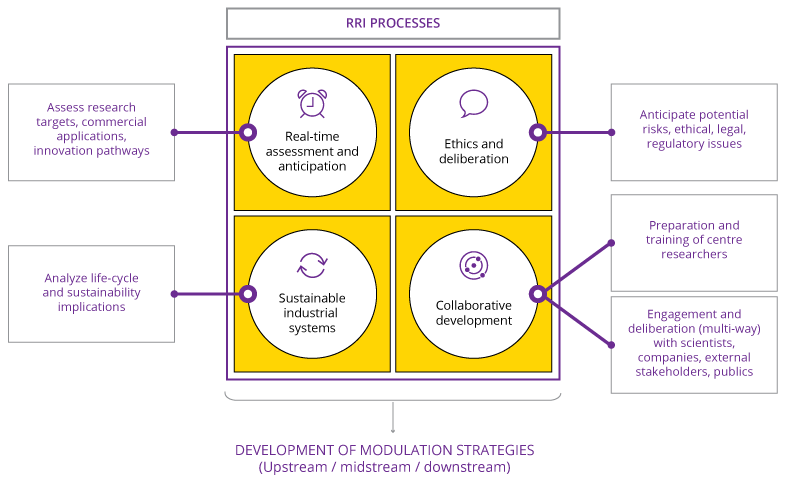

Interdisciplinary Team Embedded in the Centre
Social Sciences & humanities, Science & Innovation Policy, Sustainability. The RRI Group seeks to initiate early RRI dialogue, provide expertise, guidance and training in responsible governance of SynBio innovation, and foster public engagement and training for the research community.
See Group Members here.

Undertakes research and analysis and facilitates collaboration and deliberation:
To support the Centre to anticipate, prepare for, or mediate impacts of synthetic biology technologies on society, economy and the environment.
Current theme focus includes: Automation and digitalisation in the biosciences; Scaling the engineering of biology; and Sustainability – integrated assessment of sustainable value creation.
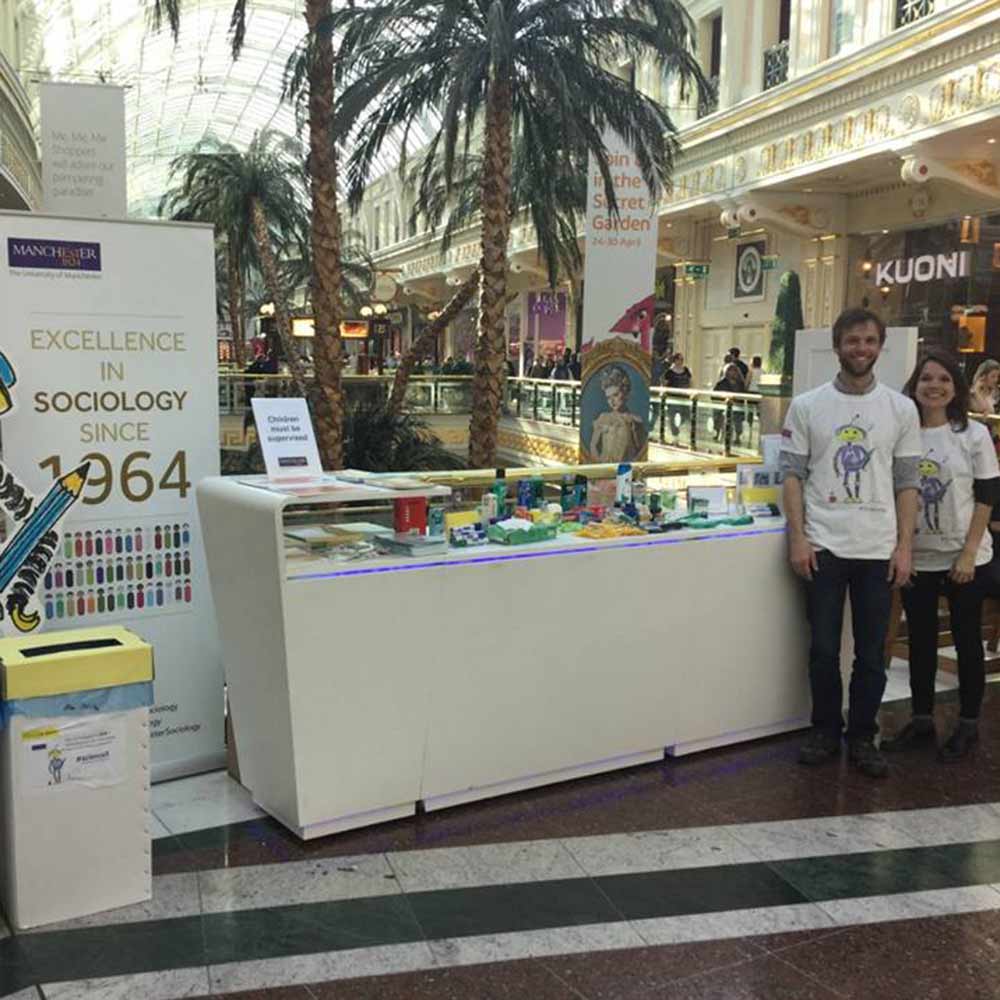
Outputs
Research, Models & engagement, Innovation & policy impact.
Ethical and Social Factors – The Centre is analysing the ethical and social factors contributing to innovation with appropriate public engagement anticipating both the intended and the potential for unintended impacts in the use and commercial development of new discoveries.

Pathways to Market
Pathways to market will encounter issues at all stages of the SynBio process and require new and appropriate regulation and governance. Lessons taken from other areas of innovation (e.g. use of GMOs) demonstrate the importance of anticipating and addressing ethical and social issues relating to new technologies at an early stage, to ensure adequate public engagement, to anticipate issues, and to feed back into decision-making.
Recent work has included working with industry to explore constructive collaborations for sustainable biotechnology and aligning sustainability assessment with RRI.
- Matthews N, Stamford L, Shapira P. (2019). Aligning sustainability assessment with responsible research and innovation: Towards a framework for Constructive Sustainability Assessment. Sustainable Production and Consumption. 20: 58-73.
- Matthews NE, Cizauskas CA, Layton DS, Stamford L, Shapira P. (2019). Collaborating constructively for sustainable biotechnology. Sci Rep. 9: 19033.
- Randles S. (2019). Interview with Piero Bassetti, President of Fondazione Giannino Bassetti, in R. Schomberg & J. Hankins). International Handbook on Responsible Innovation: A Global Resource. Cheltenham: Edward Elgar. 522-528.

Governance and Policy
SynBio emergence raises global and national governance and regulatory issues aspect from discovery through proof of principle to market. The Centre will engage with regulatory and governance issues, including working with policy stakeholders, companies, researchers, non-profits, and others to deliberate on, and develop and implement, responsible approaches.
- Ribeiro B, & Shapira P. (2019). Anticipating governance challenges in synthetic biology: Insights from biosynthetic menthol. Technological Forecasting and Social Change. 139: 311-320.
- Ribeiro B, & Shapira P. (2019). Private and public values of innovation: Asa patent analysis of synthetic biology. Research Policy. 49: 103875.

Training and Awareness
The RRI Group provides training for:
- Industry/academics to learn about and embed RRI in SynBio
- Academics/SMEs to understand the regulatory context and societal impact of SynBio
- Educating the next generation of SynBio researchers and managers in interdisciplinary and strategic skills. Including the support of iGEM teams
- Developing opportunities for the general public to access information and engage in deliberation about advances in SynBio
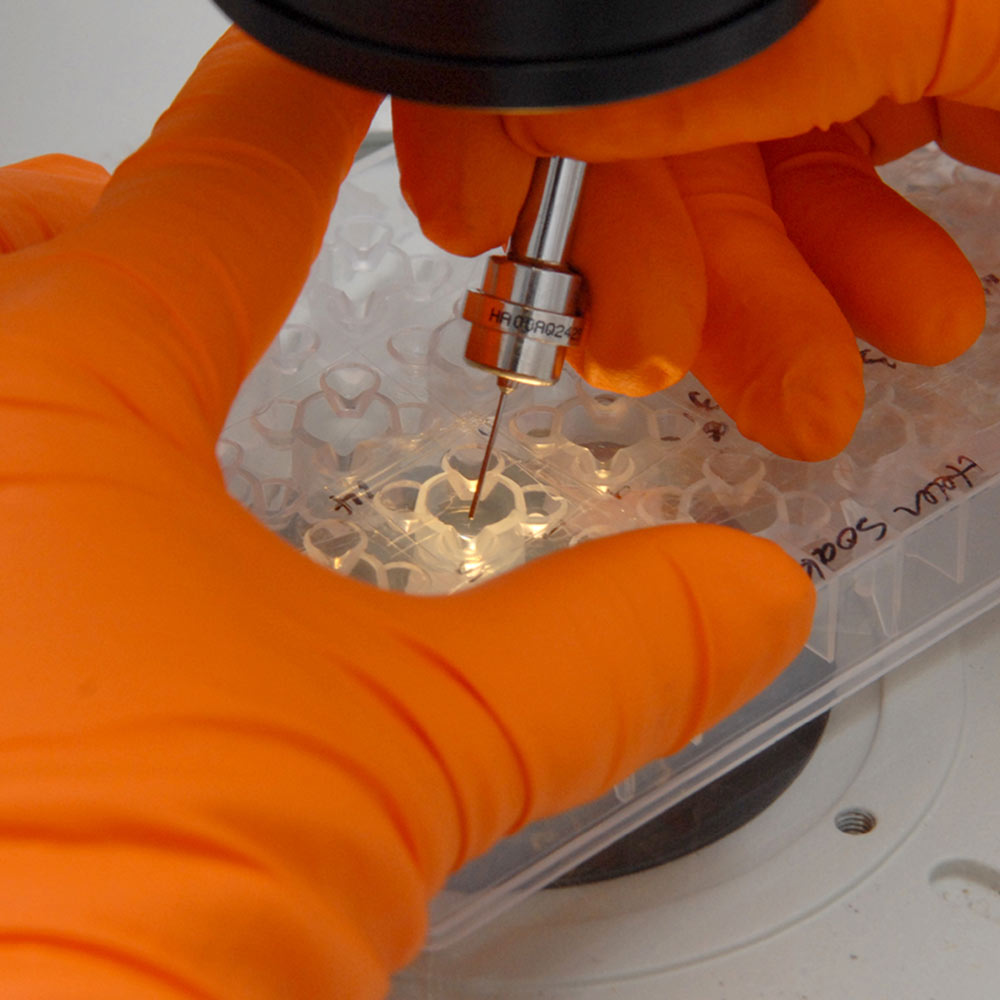
Events, Workshops and Briefs
Responsible Research and Innovation – A Manchester Perspective.
What is Responsible Research and Innovation?
Barbara Ribeiro and Philip Shapira have written a short briefing paper that provides an overview of responsible research and innovation (RRI), with concise highlights about principles of responsibility, the emergence of RRI in the UK and Europe, the EPSRC AREA framework, and RRI in Manchester.
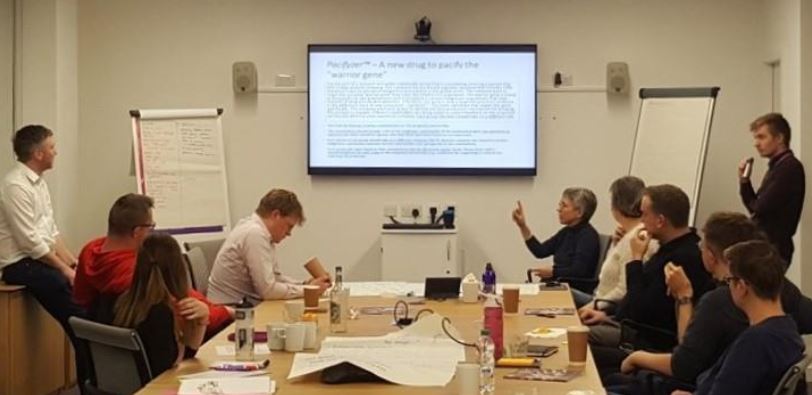
Exercises in Responsible Research and Innovation
Andrew Watkins, Chris Mellingwood and Nicholas Matthews report on experiences from a workshop for early career researchers in synthetic biology from SYNBIOCHEM and the Future Biomanufacturing Research Hub. The workshop engaged participants in discussion and two hands-on exercises on responsible research and innovation.
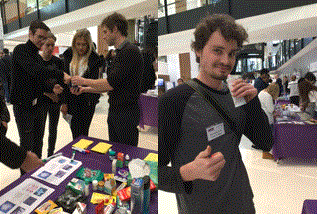
Menthol in Everyday Life
“Pop-Ups” Collect Data, Engage Publics – SYNBIOCHEM Responsible Research and Innovation (RRI) group members ran three more “pop-up” stalls in Spring 2017.
These stalls invited passers-by to interact with the taste, smell, sight and touch of menthol products. For a brief on the process and initial results – READ MORE
Selected Publications:
- The Values of Synthetic Biology: Researcher Views of Their Field and Participation in Public Engagement. Rose KM, Howell EL, Scheufele DA, Brossard D, Xenos MA, Shapira P, Youtie J, Kwon S. BioScience, 68, 10, 782–791. https://academic.oup.com/bioscience/article-pdf/68/10/782/26119341/biy077.pdf
- Synthetic Biology Research and Innovation Profile 2018: Publications and Patents. Philip Shapira and Seokbeom Kwon. Technical Report. University of Manchester, October 2018. This report presents a profile of synthetic biology research and innovation using data on publications and patents worldwide and for the UK and selected benchmark countries. DOI: 10.13140/RG.2.2.35315.78888
- Introducing the dilemma of societal alignment for inclusive and responsible research and innovation. Journal of Responsible Innovation, 2018, DOI: 10.1080/23299460.2018.1495033
- Point of View: A transatlantic perspective on 20 emerging issues in biological engineering. Wintle B, Boehm C, Rhodes C, Molloy J, Millett P, Adam L, Breitling R, Carlson R, Casagrande R, Dando M, Doubleday R, Drexler E, Edwards B, Ellis T, Evans N, Hammond R, Haseloff J, Kahl L, Kuiken T, Lichman B, Matthewman C, Napier J, Oheigeartaigh S, Patron N, Perello E, Shapira P, Tait J, Takano E, Sutherland W. eLIFE, 2017, DOI: https://doi.org/10.7554/eLife.30247.001 Web link
- Engaging the Senses, Understanding Publics: Research Methods, Science Engagement, and Synthetic Biology. Meckin R, Balmer A. Trends Biotechnol. 2017 Nov;35(11):1015-1017. Web link
- Tracking the Emergence of Synthetic Biology. Philip Shapira, Seokbeom Kwon, & Jan Youtie (2017). Scientometrics. [Open Access] https://link.springer.com/article/10.1007/s11192-017-2452-5.
- Synthetic Biology: A Sociology of Changing Practices. Basingstoke: Palgrave MacMillan. Balmer, A. S., Bulpin, K., & Molyneux-Hodgson, S. (2016).10.1057/9781137495426. Publication link: 1ab2c01e-c2b0-4d14-ace4-69920f865395 | DOI:10.1057/9781137495426
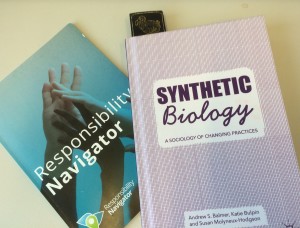
- Responsibility Navigator – Sally Randles and The Res-AGorA EU FP7 funded project have co-constructed a good-practice framework, the “Responsibility Navigator”, with practitioners and strategic decision-makers. The framework facilitates reflective processes involving multiple stakeholders and policy-makers with the generic aim of making EU research and innovation more responsible, responsive and sustainable (Kuhlmann et al.) www.responsibility-navigator.eu
